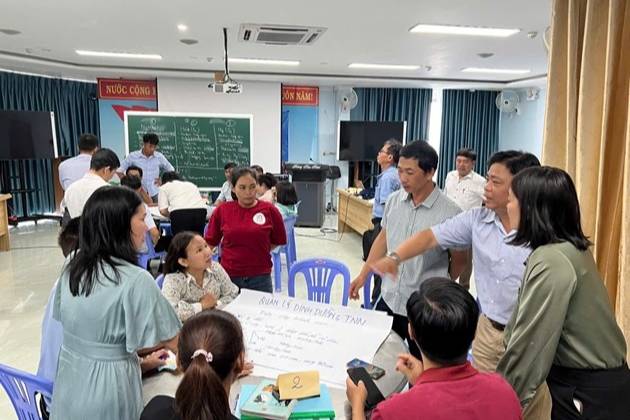The Ninh Thuan Department of Agriculture and Environment, in collaboration with the South Central Coastal Agricultural Science and Technology Institute, recently organized a Training of Trainers (TOT) course on climate-adaptive agriculture.
This initiative is part of the Strengthening the Resilience of Small-Scale Agriculture to Climate Change-Induced Water Insecurity (SACCR) Project, funded by the Green Climate Fund (GCF) and approved by the Prime Minister under Decision No. 738/QĐ-TTg dated May 20, 2021. The project is being implemented in five provinces: Dak Lak, Dak Nong, Khanh Hoa, Ninh Thuan, and Binh Thuan.
The training participants included agricultural officials from the Agricultural Service Centers and SACCR project areas in Ninh Thuận. Over three days, trainers provided knowledge on the impacts of climate change on agriculture and sustainable farming methods such as composting, integrated nutrient management (INM), crop rotation and intercropping, integrated pest management (IPM), and weed management.
 Participants discussed in the training course
Participants discussed in the training courseBeyond theoretical sessions, trainees engaged in hands-on activities at a climate-resilient apple farming model (CRA), acting as facilitators in a Farmer Field School (FFS) setting. Practical exercises included organizing FFS classes and monitoring and evaluating the effectiveness of real-world applications.
Upon completing the course, participants strengthened their teaching skills and the ability to conduct FFS training in their local communities, thereby enhancing farmers' climate adaptation capacity. This initiative represents a significant step toward promoting sustainable agriculture in Ninh Thuận and the South Central Coast region amid increasing climate challenges.
The SACCR project, from 2021 to 2026 in Dak Lak, Dak Nong, Binh Thuan, Ninh Thuan, and Khanh Hoa, aims to empower vulnerable smallholder farmers in Viet Nam's Central Highlands and South Central Coast. By ensuring water availability, promoting climate-adaptive farming practices, and improving access to climate information, credit, and markets, the project seeks to help farmers manage the escalating risks of climate change in agriculture.